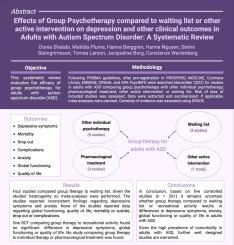Effects of group psychotherapy compared to waiting list or other active intervention on depression and other clinical outcomes in adults with autism spectrum disorder: A systematic review
Q3 Psychology
引用次数: 0
Abstract
Objective
This systematic review evaluates the efficacy of group psychotherapy for adults with autism spectrum disorder (ASD). Symptoms of depression, mortality, drop out due to lack of effect or side effects, complications, anxiety, global functioning, and quality of life were considered as outcomes.
Methods
Following PRISMA guidelines and pre-registration in PROSPERO, the databases MEDLINE, Cochrane Library, EMBASE, CINAHL, and APA PsycINFO were searched in December 2022 for studies involving adults with ASD that compared group psychotherapy with other individual psychotherapy, pharmacological treatment, other active interventions, or waiting list. The risk of bias of included studies was assessed, and data were extracted and summarized. Meta-analyses were planned if appropriate. The certainty of the evidence was assessed using GRADE.
Results
Five studies (n = 261) were included. Four studies (3 randomized controlled trials [RCTs], 1 non-RCT) compared group psychotherapy to waiting list. Given the studies’ heterogeneity no meta-analyses were performed. The studies reported inconsistent findings regarding depressive symptoms and anxiety. None of the studies reported data regarding quality of life, global functioning, mortality or suicide, drop out, or complications. One RCT comparing group psychotherapy to recreational activity found no significant difference in depressive symptoms, global functioning, or quality of life. No study comparing group psychotherapy with other individual psychotherapy or pharmacological treatment was found.
Conclusion
Based on five controlled studies it is uncertain whether group psychotherapy compared to waiting list or recreational activity results in differences in depressive symptoms, anxiety, global functioning, or quality of life in adults with ASD.

与等候名单或其他积极干预相比,团体心理治疗对成年自闭症谱系障碍患者抑郁和其他临床结果的影响:一项系统综述
目的评价团体心理治疗对成人自闭症谱系障碍(ASD)的疗效。结果包括抑郁症状、死亡率、因缺乏疗效或副作用而退出治疗、并发症、焦虑、整体功能和生活质量。方法遵循PRISMA指南和PROSPERO预注册,于2022年12月检索MEDLINE、Cochrane Library、EMBASE、CINAHL和APA PsycINFO数据库,以比较团体心理治疗与其他个体心理治疗、药物治疗、其他积极干预或等待名单的成人ASD研究。对纳入研究的偏倚风险进行评估,并对数据进行提取和汇总。如果合适,计划进行meta分析。使用GRADE评估证据的确定性。结果纳入5项研究(n = 261)。4项研究(3项随机对照试验[rct], 1项非随机对照试验[rct])比较了团体心理治疗与等候名单。考虑到研究的异质性,未进行meta分析。这些研究报告了关于抑郁症状和焦虑的不一致的发现。没有一项研究报告了有关生活质量、整体功能、死亡率或自杀、辍学或并发症的数据。一项比较团体心理治疗和娱乐活动的随机对照试验发现,在抑郁症状、整体功能或生活质量方面没有显著差异。没有研究将团体心理治疗与其他个体心理治疗或药物治疗进行比较。结论基于五项对照研究,尚不确定与等候名单或娱乐活动相比,团体心理治疗是否会导致ASD成人抑郁症状、焦虑、整体功能或生活质量的差异。
本文章由计算机程序翻译,如有差异,请以英文原文为准。
求助全文
约1分钟内获得全文
求助全文
来源期刊

Journal of Affective Disorders Reports
Psychology-Clinical Psychology
CiteScore
3.80
自引率
0.00%
发文量
137
审稿时长
134 days
 求助内容:
求助内容: 应助结果提醒方式:
应助结果提醒方式:


